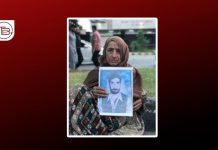The Baloch Yakjehti Committee (BYC) organized a public awareness session in Gwadar on Saturday, where it discussed the China-Pakistan Economic Corridor (CPEC) and its adverse effects on Balochistan. The session was attended by political and social activists, BYC leaders, and local people.
The session started with the Baloch national anthem, followed by a panel discussion on the current situation of Gwadar, the foreign investment in the city, and the reality behind the so-called ‘development’ projects in the region. The panelists also highlighted the environmental degradation and destruction caused by the CPEC projects and their impact on the people of Gwadar.
One of the panelists, KB Firaq Baloch, said that the Pakistani media had created a false image of Gwadar as a developed and prosperous city, while in fact it was a façade to cover up the Pakistani and Chinese interests in the region. He said that the infrastructure that was built in Gwadar had worsened the recent floods and rains that devastated the city and left the people helpless.
He also said that the CPEC projects were aimed at displacing the people of Gwadar from their ancestral land and replacing them with foreigners, especially the Chinese and the Punjabis. He said that the people of Gwadar depended on fishing for their livelihood, and if they were forced out of the city, they would die like fish out of water.
Another panelist, Hafeez Baloch, spoke about the historical connection between the people of Gwadar and Karachi, and how the Pakistani state had ‘occupied’ Karachi after the partition of the subcontinent. He said that the people of Malir, a historically important area for the Baloch people in Karachi, were being evicted from their land and the area was being turned into mega projects.
The panelists stressed that the development projects could not succeed without the consent and participation of the people, and that without public support, these projects were nothing but exploitation. They urged the people to understand the difference between ‘development’ and ‘ecocide’, and said that the so-called development was actually genocide.
A student, Sadia Baloch, answered a question about the causes and consequences of the heavy flooding in Balochistan, and said that the reasons were the same for both the urban and rural areas of the province. She said that the CPEC projects and other infrastructure had disrupted the natural drainage system and increased the vulnerability of the people to floods and other disasters.
At the end of the session, Dr. Mahrang Baloch, addressed the gathering and said that a colonial state does not only kill people with weapons, but also uses various tactics to push them out of their homeland, as it was happening in Gwadar where the locals were inundated in recent floods.
She said that the Pakistani state is committing genocide in many ways in Balochistan, and that the session was held to show solidarity with the people of Gwadar and to assure them that the rest of Balochistan is with them. She said that they would liberate our people from this ‘oppressive’ system and give them the full right to live their lives with freedom.






























